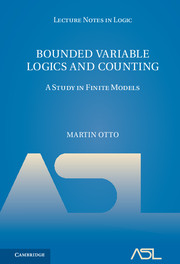Introduction
Published online by Cambridge University Press: 24 March 2017
Summary
Finite Models, Logic and Complexity
Finite model theory deals with the model theory of finite structures. As a branch of model theory it is concerned with the analysis of structural properties in terms of logics. The attention to finite structures is not so much a restriction in scope as a shift in perspective. The main parts of classical model theory (the model theory related to first-order logic) as well as of abstract model theory (the comparative model theory of other logics) almost exclusively concern infinite structures; finite models are disregarded as trivial in some respects and as intractable in others. In fact, the most successful tools of classical model theory fail badly in restriction to finite structures. The compactness theorem in particular, which is one of the corner stones of classical model theory, does not hold in the realm of finite structures. Several examples of other important theorems from classical model theory that are no longer true in the finite case are discussed in [Gur84].
There are on the other hand specific new issues to be considered in the finite. These issues mainly account for the growing interest in finite model theory and promote its development into a theory in its own right. One of the specific issues in a model theory of finite structures is complexity. Properties and transformations of finite structures can be considered under algebraic and combinatorial aspects, under the aspect of logical definability, and also under the aspect of computational complexity. Issues of computational complexity form one of the main links also between finite model theory and theoretical computer science.
In this introduction I merely intend to indicate selectively some main ideas and lines of research that motivate the present investigations. There are a number of surveys that also cover various other aspects of finite model theory — see for instance [Fag90, Gur84, Gur88, Imm87a, Imm89]. A general reference is the new textbook on finite model theory by Ebbinghaus and Flum [EF95].
Information
- Type
- Chapter
- Information
- Bounded Variable Logics and CountingA Study in Finite Models, pp. 1 - 14Publisher: Cambridge University PressPrint publication year: 2017
